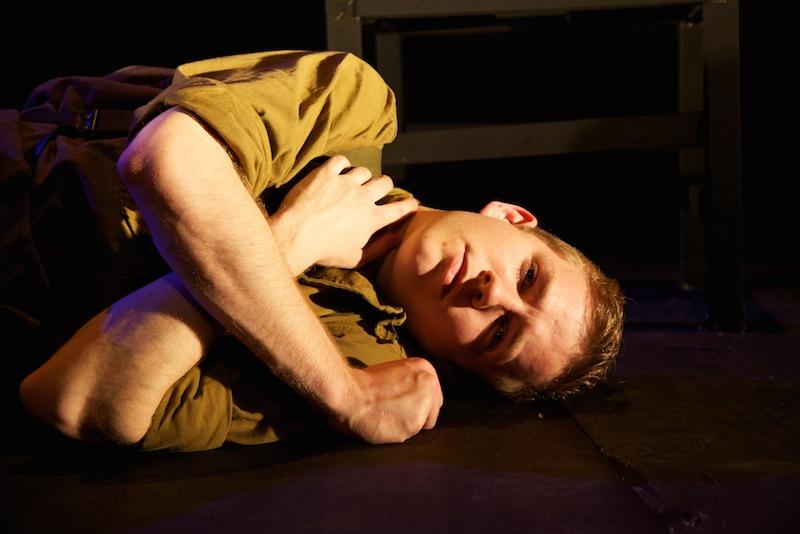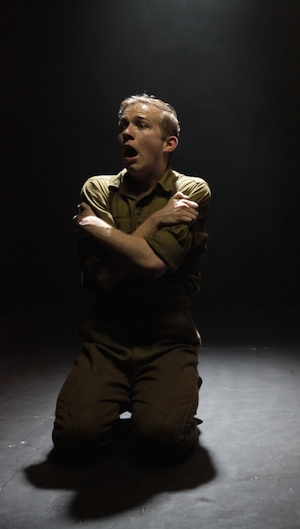Johnny Got His Gun, Southwark Playhouse | reviews, news & interviews
Johnny Got His Gun, Southwark Playhouse
Johnny Got His Gun, Southwark Playhouse
Visceral American anti-war play gets a timely London premiere

"Johnny get your gun" was a popular American recruiting call in the late Nineteenth and early Twentieth centuries and, according to the Irish-American song "When Johnny comes marching home, Hurrah, Hurrah", there should be celebration for him after battle. The Johnny of this story, Joe Bonham, an ordinary "Joe", got his gun alright, but there is no happy ending for him.
The name of Dalton Trumbo, author of the novel on which the play is based, appears on posters for this production as part of the title. One of the "Hollywood 10" who went to prison rather than testify to the House Un-American Activities Committee during anti-Communist paranoia in 1947, he was blacklisted until the early 1960s. He nevertheless eventually won two Oscars for screenplays and was acknowledged as the script-writer for Spartacus. Trumbo's National Book Award-winning novel, Johnny Got His Gun, was published just as Britain went to war in 1939.
We are drawn into the nightmare but sympathy is not enough
A film based on the book appeared in 1971 and it was adapted for the stage by Bradley Rand Smith more than thirty years ago when it won an Obie Award off-Broadway. This production (by Metal Rabbit) marks the play's UK premiere, and coming in this centenary year of the outbreak of the First World War, it is as timely as ever.
Smith, director David Mercatali and Jack Holden, in a stunning performance as Joe, combine to celebrate life, to present the positive aspects of ordinary existence as much as the waste of war. This is no sentimental weepie. Joe begins as an idealist in love with his girl and wanting to do the right thing for America by joining up as a volunteer. He ends longing to die, a prisoner in his body without even a name. We are drawn into the nightmare but sympathy is not enough. Joe is angry; if he can't die - euthanasia being "against regulations" - he'd like to be an exhibit in a glass box shown to the populace to undermine any notions of the glory of war.
 Alone on stage for 70 minutes, with no more than a chair and mood-changing lighting by Christopher Nairne to help him, Holden inhabits Joe utterly as he speaks his thoughts aloud. He is equally compelling when he moves freely, remembering small-town life, fishing with his father and squabbling over girlfriends, as he is when furious at his helplessness, inert and - until he hits on the idea of banging his head to convey Morse code - incommunicado. Occasionally Holden slips in a swift, colourful cameo too - a moustachioed colonel or a British Tommy.
Alone on stage for 70 minutes, with no more than a chair and mood-changing lighting by Christopher Nairne to help him, Holden inhabits Joe utterly as he speaks his thoughts aloud. He is equally compelling when he moves freely, remembering small-town life, fishing with his father and squabbling over girlfriends, as he is when furious at his helplessness, inert and - until he hits on the idea of banging his head to convey Morse code - incommunicado. Occasionally Holden slips in a swift, colourful cameo too - a moustachioed colonel or a British Tommy.
The writing is as lyrical when Joe recalls his mother making jam, humming in the kitchen, or the pleasure of lying on his back in the local Colorado river as it is brutal in the descriptions of death in the trenches. His lost senses, especially sight and smell, play a powerful role in these memories. Simple domesticity, family affection and the countryside provide powerful arguments for peace. Joe's fury reaches a crescendo - unexpressed to those around him but vividly clear to us - when the top brass, all equipped with the correct number of limbs, pin a medal on his ruined body. Highly recommended.
rating
Explore topics
Share this article
The future of Arts Journalism
You can stop theartsdesk.com closing!
We urgently need financing to survive. Our fundraising drive has thus far raised £49,000 but we need to reach £100,000 or we will be forced to close. Please contribute here: https://gofund.me/c3f6033d
And if you can forward this information to anyone who might assist, we’d be grateful.

Subscribe to theartsdesk.com
Thank you for continuing to read our work on theartsdesk.com. For unlimited access to every article in its entirety, including our archive of more than 15,000 pieces, we're asking for £5 per month or £40 per year. We feel it's a very good deal, and hope you do too.
To take a subscription now simply click here.
And if you're looking for that extra gift for a friend or family member, why not treat them to a theartsdesk.com gift subscription?
more Theatre
 50 First Dates: The Musical, The Other Palace review - romcom turned musical
Date movie about repeating dates inspires date musical
50 First Dates: The Musical, The Other Palace review - romcom turned musical
Date movie about repeating dates inspires date musical
 Bacchae, National Theatre review - cheeky, uneven version of Euripides' tragedy
Indhu Rubasingham's tenure gets off to a bold, comic start
Bacchae, National Theatre review - cheeky, uneven version of Euripides' tragedy
Indhu Rubasingham's tenure gets off to a bold, comic start
 The Harder They Come, Stratford East review - still packs a punch, half a century on
Natey Jones and Madeline Charlemagne lead a perfectly realised adaptation of the seminal movie
The Harder They Come, Stratford East review - still packs a punch, half a century on
Natey Jones and Madeline Charlemagne lead a perfectly realised adaptation of the seminal movie
 The Weir, Harold Pinter Theatre review - evasive fantasy, bleak truth and possible community
Three outstanding performances in Conor McPherson’s atmospheric five-hander
The Weir, Harold Pinter Theatre review - evasive fantasy, bleak truth and possible community
Three outstanding performances in Conor McPherson’s atmospheric five-hander
 Dracula, Lyric Hammersmith review - hit-and-miss recasting of the familiar story as feminist diatribe
Morgan Lloyd Malcolm's version puts Mina Harkness centre-stage
Dracula, Lyric Hammersmith review - hit-and-miss recasting of the familiar story as feminist diatribe
Morgan Lloyd Malcolm's version puts Mina Harkness centre-stage
 Reunion, Kiln Theatre review - a stormy night in every sense
Beautifully acted, but desperately grim drama
Reunion, Kiln Theatre review - a stormy night in every sense
Beautifully acted, but desperately grim drama
 The Code, Southwark Playhouse Elephant review - superbly cast, resonant play about the price of fame in Hollywood
Tracie Bennett is outstanding as a ribald, riotous Tallulah Bankhead
The Code, Southwark Playhouse Elephant review - superbly cast, resonant play about the price of fame in Hollywood
Tracie Bennett is outstanding as a ribald, riotous Tallulah Bankhead
 The Lady from the Sea, Bridge Theatre review - flashes of brilliance
Simon Stone refashions Ibsen in his own high-octane image
The Lady from the Sea, Bridge Theatre review - flashes of brilliance
Simon Stone refashions Ibsen in his own high-octane image
 Romans: A Novel, Almeida Theatre review - a uniquely extraordinary work
Alice Birch’s wildly epic family drama is both mind-blowing and exasperating
Romans: A Novel, Almeida Theatre review - a uniquely extraordinary work
Alice Birch’s wildly epic family drama is both mind-blowing and exasperating
 The Producers, Garrick Theatre review - Ve haf vays of making you laugh
You probably know what's coming, but it's such great fun!
The Producers, Garrick Theatre review - Ve haf vays of making you laugh
You probably know what's coming, but it's such great fun!
 Not Your Superwoman, Bush Theatre review - powerful tribute to the plight and perseverance of Black women
Golda Rosheuvel and Letitia Wright excel in a super new play
Not Your Superwoman, Bush Theatre review - powerful tribute to the plight and perseverance of Black women
Golda Rosheuvel and Letitia Wright excel in a super new play

Add comment